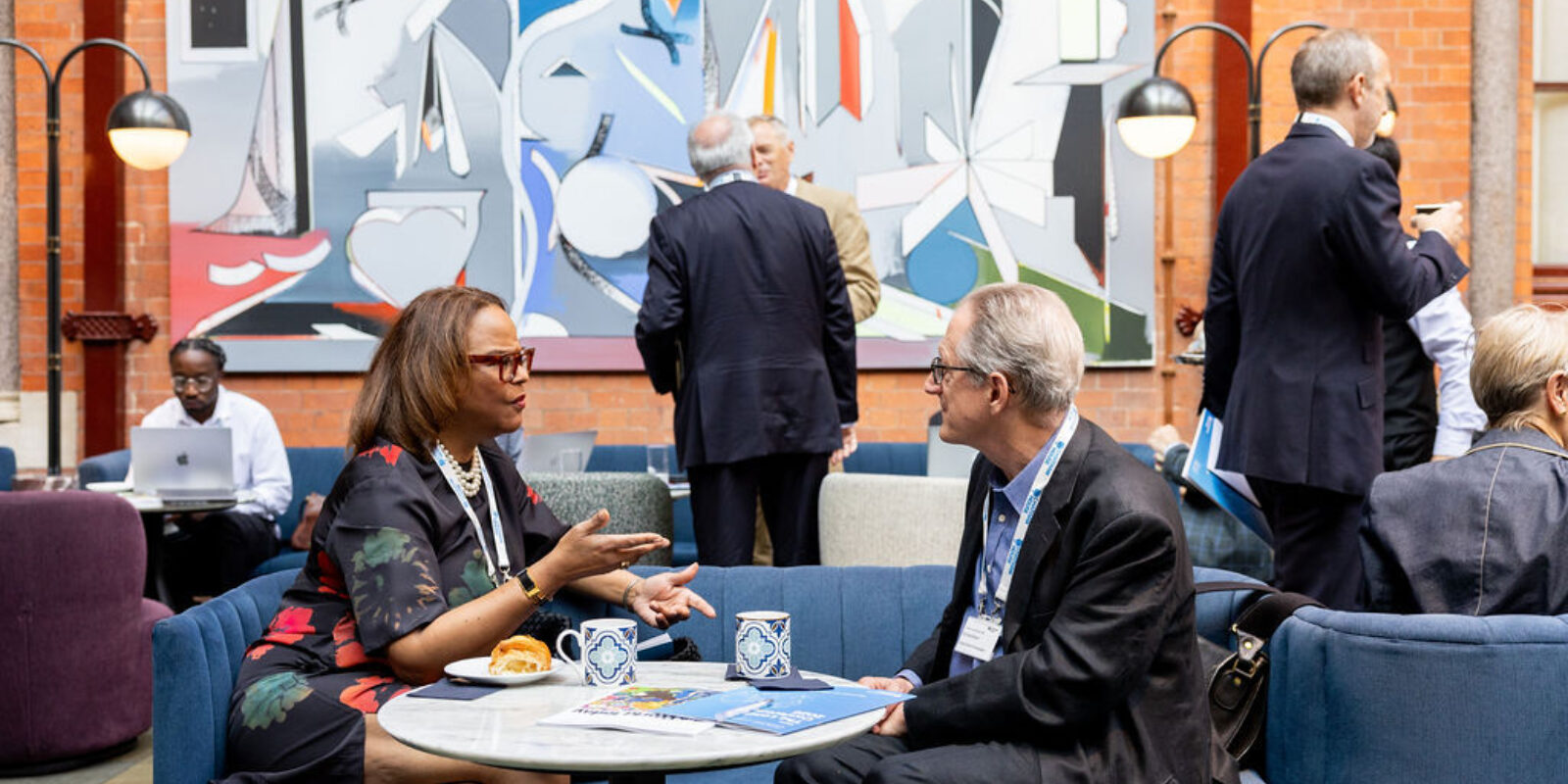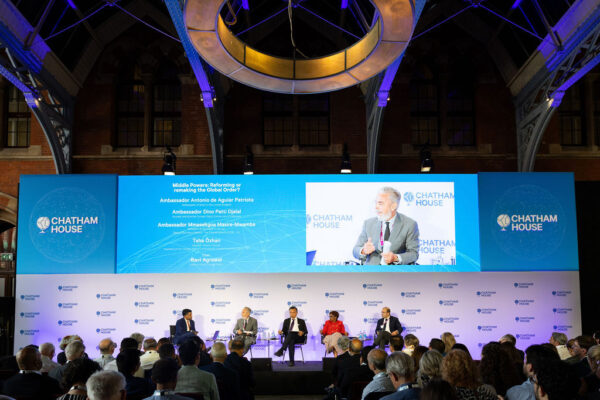Three takeaways from the season of summer events
After a stimulating season of events, the Accelerator brings you some of our highlights and the questions we’ll be contemplating on our holidays.

Delegates chatting at London Conference. Photo: Carmen Valino.
It’s officially the summer and the SA team members are very ready for a holiday…
But, before we hang the “gone fishing” sign on the Chatham House door, we have a few thoughts to leave you with.
The Accelerator has been quietly busy during the season of summer events. We took part in Chatham House’s flagship conference, the London Conference; attended a shed load of interesting discussions during LCAW; and even hosted a couple of (under-the-rule) discussions of our own, on topics linked to Collapse, Uncertainty and Renewal.
So, before we jet (or more accurately sustainably slow travel) off, here are some of our reflections from those discussions:
Notes from LCAW
This year’s London Climate Action Week was the largest yet – with over 700 events spread across the City. With so many events, a comprehensive round up is hardly possible – but from our experience, a few key themes emerged.
Most significant amongst them was the contrast between those discussions that imaginatively and practically inhabited the implications of the present moment, and those who are still shaking off the lineaments of a COP26-era mindset. The best conversations we were involved with were deeply aware of the implications of a post 1.5 world. Whilst these discussions could be sobering, they were also a source of imagination, energy and genuine world-shaping intent.
A few highlights. We engaged in fascinating discussions with University of Exeter’s Nature and Climate Impact Team and M+C Saatchi Group about how to communicate in a degraded info-scape that will not get "fixed" on the timescales needed for climate action. We relished the rich exchanges hosted by Wicked Acceleration Labs, exploring how innovation for the new climate realities can be unlocked in interdisciplinary enquiry – particularly the mindset-mashups of commercial ventures praxis and new forms of civic organisation. Finally, it was fantastic to see a growing body of practical guidance on how to think more expansively about adaptation – embodied in the clear-eyed, sleeves-rolled-up attitude of UK Green Building Council (UKGBC)'s new Climate Resilience Roadmap.
For us, the major question emerging from LCAW is this: how can we speed up the process by which a broader range of institutions and sectors wrestle with the implications of a 1.5 world? And help them do so in a way that avoids the pitfalls of overwhelm or paralysis, and speeds up the kind of transformative action we need?
Notes from the London Conference
At the end of June Chatham House hosted its annual London Conference, inviting key stakeholders from across the globe to explore the most pressing issues in international affairs. This year, sessions explored the challenge of building global governance in a world without rules. Conversations on the day were rich and varied, from explorations of how the US is attempting to build a ‘spheres of influence’ approach to international relations, to the political and human dimensions of military action in Iran.
A highlight was the session exploring how Middle Powers are experiencing and shaping the global order. Representatives from these countries detailed a growing cynicism among the global south towards the western-founded rules-based order, which they view the West as consistently undermining. But there was optimism in the growing opportunities for historically less-influential states to have a greater impact. Mmasekgoa Masire-Mwamba, the Botswanan Ambassador, pointed to the International Court of Justice case, which has since demonstrated how a Pacific Island State can hold more powerful, developed nations to account for failing to meet their legal obligations to address climate change.
In this nuanced geopolitical context, we were left asking how the threats to the rules-based order might challenge or reshape global progress on climate? As the global order is being flipped on its head, can new dynamics be harnessed to accelerate action?

The Middle Powers session at the London Conference. Photo: Carmen Valino.
Notes from two under-the-rule roundtables
During June and July, the Sustainability Accelerator also hosted two roundtables – exploring the dynamics of decision-making within business during a time of climate shock and geopolitical change.
One focused on “rethinking insurance”, in the context of the existential threats the industry currently faces. In this wide-ranging discussion, participants shared agreement on the gravity of the situation, but expressed significant differences of opinion on how to respond to. Much discussion focused on the relative importance of individual company initiatives in comparison collective sectoral action, and the extent to which existing cross-institutional frameworks are fit for purpose for the challenges ahead.
Our second session focused on “uncertainty in the boardroom”, and the ways in which both the experiences of 2025 and historical precedents like the COVID era exposed the limitations of traditional forms of decision-making within commercial organisations. The discussion offered rich examples of how and where business and finance is finding ways to step into uncertainty – often in ways that run in parallel to traditional strategic processes. The session also reflected on our changing understanding of the qualities of leadership required in a time of change. In particular, the discussion explored how cultural expectations of absolute confidence and assertive authority in decision-makers can to maladaptive decisions.
In both discussions, a common theme emerged - in a time of intense change and new climate realities, how can we better leverage business’s natural capacity to innovate in ways that balance risk and opportunity? And what support can be put in place to ensure we do so in ways that drive benefit for both individual businesses and broader society?
Thank you to everyone who took part in the discussions above – it has a very busy and very rich few months. All these insights and more are being incorporated into our research cycle The Rift. Please do get in touch if you would like to be a part of it.





